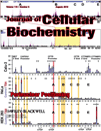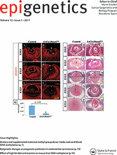
Reports of Biochemistry and Molecular Biology
Scope & Guideline
Advancing biochemistry through open access research.
Introduction
Aims and Scopes
- Biomarkers and Disease Correlation:
The journal focuses on the identification and validation of biomarkers for various diseases, exploring their roles in diagnosis, prognosis, and treatment outcomes. - Molecular Mechanisms in Cancer:
Research on the molecular mechanisms underlying cancer progression, treatment responses, and the development of novel therapeutic strategies is a core theme. - Genetic and Epigenetic Studies:
Studies investigating genetic polymorphisms, gene expression, and epigenetic modifications related to disease susceptibility and progression, particularly in cancer, are prevalent. - Oxidative Stress and Inflammation:
The journal includes research on the roles of oxidative stress and inflammatory processes in various diseases, emphasizing their biochemical mechanisms and potential therapeutic targets. - Nanotechnology in Medicine:
Innovative applications of nanotechnology in drug delivery and therapeutic interventions are explored, highlighting their potential in enhancing treatment efficacy. - MicroRNA and Non-Coding RNAs:
The role of microRNAs and long non-coding RNAs in disease mechanisms and their potential as therapeutic targets or biomarkers is a significant focus.
Trending and Emerging
- Personalized Medicine and Pharmacogenomics:
There is a growing emphasis on personalized medicine, particularly studies that explore the genetic basis of drug responses and individual treatment plans. - Role of Non-Coding RNAs in Disease:
Research on the functional roles of non-coding RNAs, especially microRNAs, in various diseases has surged, indicating their potential as biomarkers and therapeutic targets. - Impact of Environmental Factors on Health:
Emerging studies linking environmental exposures (e.g., pollutants, dietary components) to biochemical changes and disease mechanisms highlight the relevance of environmental health. - Innovative Therapeutics and Drug Delivery Systems:
There is an increasing focus on novel therapeutic strategies, particularly those involving nanotechnology and advanced drug delivery systems, demonstrating innovation in treatment approaches. - Systems Biology and Multi-Omics Approaches:
The integration of systems biology and multi-omics approaches in understanding complex biological systems and diseases is gaining traction, reflecting a holistic view of health.
Declining or Waning
- Traditional Biochemical Methods:
Research employing classical biochemical techniques without integration of modern molecular biology approaches has seen a decline, as the field moves towards more advanced methodologies. - Non-Specific Dietary Studies:
Studies focused solely on non-specific dietary impacts on health without molecular or biochemical mechanisms are less frequent, suggesting a shift towards more mechanistic research. - Animal Models in Isolation:
Research utilizing animal models without clear translational implications to human health or disease mechanisms is becoming less common, as the journal emphasizes relevance to human health.
Similar Journals

BIOCHEMICAL SOCIETY TRANSACTIONS
Advancing Biochemical Knowledge for a Brighter FutureBIOCHEMICAL SOCIETY TRANSACTIONS is a premier journal published by Portland Press Ltd, renowned for its rigorous dissemination of cutting-edge research in the field of biochemistry. Established in 1973 and currently spanning until 2024, this journal has solidified its standing with an impressive Q1 category ranking in Biochemistry, reflecting its commitment to high-quality scholarship and innovation. It plays a crucial role in bridging current biochemical research with its practical applications, making it an invaluable resource for researchers, professionals, and students alike. The journal enjoys a commendable position in the Scopus Ranks, sitting at Rank #105 out of 438 journals in its category, placing it in the 76th percentile among similar publications. While the journal maintains a subscription-only access policy, it promises to provide readers with comprehensive insights and discoveries that drive advancements in biochemistry and related fields. This journal is not just a repository of information; it is a vibrant community dedicated to the progress of biochemistry, making it essential reading for anyone involved in this dynamic discipline.

PPAR Research
Innovating Therapeutics through PPAR ResearchPPAR Research, an esteemed journal published by HINDAWI LTD, specializes in the rapidly evolving fields of drug discovery and pharmacology, contributing significantly to the body of research surrounding peroxisome proliferator-activated receptors (PPARs) and their roles in various biochemical processes. With an open access policy implemented since 2006, the journal ensures that its high-quality content is readily available, promoting widespread dissemination of knowledge. Currently ranked in the Q2 category for both Drug Discovery and Medical Pharmacology, it boasts a respectable position within the scientific community, evidenced by its Scopus rankings. PPAR Research serves as an essential resource for researchers, professionals, and students looking to advance their understanding of PPAR biology and its implications in therapeutic development. The journal's commitment to excellence and accessibility makes it a key player in supporting innovative research and critical discussions in the life sciences.

JOURNAL OF CELLULAR BIOCHEMISTRY
Elevating Biochemical Insights for Tomorrow's ScienceJournal of Cellular Biochemistry is a premier academic journal dedicated to advancing the field of biochemistry and cellular biology. Published by Wiley, this influential journal has a significant impact factor that underscores its relevance and authority within the scientific community. With its ISSN 0730-2312 and E-ISSN 1097-4644, the journal has been on the frontier of research since its inception in 1982, and is expected to continue publishing cutting-edge studies through 2024. As evidenced by its ranking in the 2023 Scopus Quartiles, it holds a rank of Q2 in Biochemistry and Q3 in both Cell and Molecular Biology, placing it among the top tiers of scientific journals in these disciplines. The Journal of Cellular Biochemistry serves as a vital resource for researchers, professionals, and students alike, providing a platform for the dissemination of innovative ideas and findings that shape our understanding of cellular processes and biochemical pathways. Though it does not currently offer Open Access options, its robust peer-review process ensures that each publication meets the highest academic standards, thus solidifying its esteemed position in the landscape of biochemical research.

Non-Coding RNA
Unlocking the Mysteries of Non-Coding RNANon-Coding RNA is a prestigious open-access journal published by MDPI, based in Switzerland, dedicated to the significant and rapidly evolving field of non-coding RNA research. Established in 2015, this journal has quickly become an essential resource for researchers and professionals, showcasing innovative studies and breakthroughs related to the functions and mechanisms of non-coding RNAs in various biological processes. With an impressive Q1 ranking in Biochemistry and strong rankings in Genetics and Molecular Biology, Non-Coding RNA consistently reflects the highest standards of academic publishing. The journal provides comprehensive access options, granting researchers worldwide the ability to disseminate and access high-quality research without subscription barriers. As the landscape of genomics and molecular discoveries continues to expand, the journal aims to foster interdisciplinary exchanges and collaborations, making it a vital platform for advancing knowledge and innovation in this critical area of biological science.

JOURNAL OF BIOCHEMICAL AND MOLECULAR TOXICOLOGY
Pioneering Research in Biochemical InteractionsJournal of Biochemical and Molecular Toxicology, published by Wiley, plays a pivotal role in the advancement of knowledge within the fields of biochemistry, toxicology, and molecular biology. Established in 1998, this esteemed journal has garnered a significant reputation, evidenced by its current placement in the Q2 quartile across several categories, including Biochemistry, Health, Toxicology and Mutagenesis, and Medicine. With an ISSN of 1095-6670 and an E-ISSN of 1099-0461, it serves an international audience, offering critical insights and innovative research that shape our understanding of biochemical interactions and toxicological assessments. While it does not operate on an open-access model, the journal ensures rigorous peer review and high-quality publication standards, making it a valuable resource for researchers, professionals, and students dedicated to the exploration of molecular toxicology. The journal's recognized impact within the scientific community is reflected in its competitive rankings among specialized journals, fostering significant contributions to both academic and applied contexts.

Cell Stress
Pioneering Insights into Cellular ResilienceCell Stress is a prestigious, peer-reviewed open access journal dedicated to advancing research in the fields of biochemistry, genetics, molecular biology, cancer research, and physiology. Published by SHARED SCIENCE PUBLISHERS OG in Austria, this journal has rapidly established itself since its inception in 2017, achieving Q1 status in multiple categories, indicative of its high impact and quality. With an impressive Scopus ranking—holding a top percentile position in its respective fields—Cell Stress aims to foster interdisciplinary collaboration and disseminate cutting-edge findings that enhance our understanding of cellular stress mechanisms and their implications in health and disease. The journal's commitment to open access since its launch ensures that critical research is accessible to a global audience, thereby facilitating the exchange of knowledge among researchers, professionals, and students alike. Address your submissions or inquiries to AM BLUMENHAG 25-4, Graz 8010, Austria, and contribute to this dynamic platform that is shaping the future of molecular medicine.

Biochemistry and Cell Biology
Advancing the frontiers of biochemistry and cell biology.Biochemistry and Cell Biology, published by Canadian Science Publishing, is a prestigious journal that has been instrumental in advancing the fields of biochemistry, molecular biology, and cell biology since its inception in 1986. With an impressive scope spanning innovative research findings to comprehensive reviews, this journal serves as a vital resource for researchers, professionals, and students alike. Currently positioned in the Q2 quartile in Biochemistry and Q3 quartiles in both Cell Biology and Molecular Biology, it reflects a robust contribution to scientific discourse, placing it among reputable publications in its field. The journal boasts notable rankings within the Scopus database, highlighting its impact and relevance, and continues to be a valuable platform for disseminating pivotal research. By providing access to a wide array of articles, the journal remains committed to fostering knowledge and collaboration in the scientific community.

Molecular Cancer
Leading the charge in innovative cancer solutions.Molecular Cancer, published by BMC, stands as a premier open access journal dedicated to advancing our understanding of cancer biology, treatment, and prevention since its inception in 2002. With an impressive Q1 ranking in the domains of Cancer Research, Molecular Medicine, and Oncology, this journal occupies a significant position in the academic landscape, emphasizing high-quality research that influences clinical practices and future studies. The journal is indexed in leading databases with exceptional Scopus ranks, reflecting its rigorous peer-review process and impactful contributions to the field, where it ranks in the top 2-3 positions across various relevant categories. Based in the United Kingdom, Molecular Cancer offers researchers worldwide a valuable platform for disseminating innovative findings that drive the biomedical community forward. The journal's open access model ensures that groundbreaking research is freely accessible, fostering collaboration and knowledge sharing among professionals, students, and academics alike. Explore cutting-edge developments in cancer research through Molecular Cancer and join a community committed to improving patient outcomes and advancing scientific discovery.

CELLULAR SIGNALLING
Elevating Insights into Cellular CommunicationCELLULAR SIGNALLING, published by Elsevier Science Inc, is a premier journal within the realm of Cell Biology, boasting an impressive Q2 category ranking as of 2023. With an ISSN of 0898-6568 and an E-ISSN of 1873-3913, the journal has established itself as a critical platform for advancing the understanding of cellular mechanisms and signal transduction pathways since its inception in 1989. Covering a vast array of topics in Biochemistry, Genetics, and Molecular Biology, it ranks notably at 87 out of 285 in the Scopus list, placing it in the 69th percentile among its peers. The journal serves as an invaluable resource for researchers, professionals, and students seeking high-quality, impactful studies that drive forward the field of cellular biology. While it operates under traditional subscription access, its highlights include rigorous peer-reviewed articles, reviews, and insights that continue to shape current scientific discourse.

Epigenetics
Innovating Knowledge in Cancer Research and Molecular BiologyEpigenetics, published by Taylor & Francis Inc, is a leading journal in the fields of Cancer Research, Medicine (miscellaneous), and Molecular Biology. With an ISSN of 1559-2294 and an E-ISSN of 1559-2308, this journal has been paving the way for groundbreaking research since its inception in 2006, and it continues to play a crucial role in advancing our understanding of epigenetic mechanisms and their implications in health and disease. The journal is highly regarded, ranking in the Q1 category for Medicine and Q2 for both Cancer Research and Molecular Biology according to the 2023 category quartiles. Researchers and professionals in the field will find invaluable insights and innovative studies within its pages, making it an essential resource for those engaged in cutting-edge research. Although the journal is not open access, it encourages a comprehensive understanding through high-quality peer-reviewed content. With its creative exploration of the epigenetic landscape, Epigenetics serves as a vital platform for the sharing of knowledge that could lead to breakthroughs in treatments and therapies.